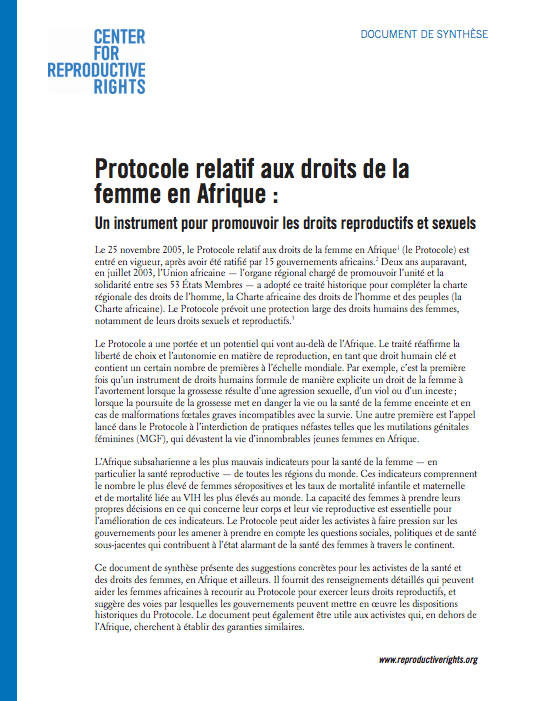State of Denial: Adolescent Reproductive Rights in Zimbabwe
Using a human rights fact-finding methodology, researchers from the Center for Reproductive Rights and the Child and Law Foundation in Zimbabwe documented legal, policy and social barriers to Zimbabwean adolescents’ enjoyment of their international human right to access dual protection methods and information. Their report State of Denial: Adolescent Reproductive Rights in Zimbabwe examines the realities of adolescents’ sexual and reproductive lives and argues that the government has a duty under international human rights law to take action to ensure adolescents’ human rights.
Reproductive Health Concerns of Zimbabwean Adolescents
Adolescents constitute approximately 36% of the total population of Zimbabwe. The government of Zimbabwe faces the formidable task of meeting the crucial needs of this special group, including the prevention of unwanted pregnancies and STIs. In Zimbabwe, the onset of sexual activity generally begins before marriage. Close to 40% of female adolescents in Zimbabwe are already mothers by the time they are 19 years old and it is not uncommon for girls to bear children as early as age 13.
The urgency of fulfilling adolescents’ right to access dual protection methods and information is heightened by soaring national HIV/AIDS prevalence rates. Zimbabwe ranks third in the world in the prevalence of HIV/AIDS, with up to 26% of girls and women between the ages of 15-24 infected. In addition, Zimbabwe is faced with exceedingly high maternal mortality rates, in part attributed to unsafe, illegal abortion. Unfortunately, despite the early onset of sexual activity, Zimbabwean adolescents have a limited understanding of how to prevent pregnancy and STIs, including HIV/AIDS. In a 1999 survey, 25% of adolescents did not know what STIs were and a further 46% believe that a girl cannot get pregnant if she has sex standing up.
Adolescents’ Human Right to Access Dual Protection Methods and Information
The phrase “dual protection methods” refers to means of preventing simultaneously unwanted pregnancy and sexually transmissible infections (STIs), inlcuding HIV/AIDS. Dual protection methods include use of a condom alone or a condom in combination with another contraceptive method.
Adolescents’ right to access dual protection methods and information is a component of a broader set of internationally recognized reproductive rights, including the fundamental rights to reproductive health, to information and education, to reproductive self-determination, and to equality and non-discrimination. According to international standards, adolescents are entitled to the same rights as adults with respect to services and information on contraception and STI prevention. Both the “evolving capacity of the child” standard and the “best interest of the child” standard, found in the Convention on the Rights of the Child as well as in regional human rights instruments, resolve the apparent conflict between adolescents’ rights and parental decision-making authority.
Ineffective National Legal and Policy Framework
Zimbabwean national laws and policies do not meet international human rights standards regarding adolescents’ right to access dual protection methods and information, leaving adolescents vulnerable to the grave health risks associated with early onset of sexual activity. Public health service providers are left to navigate a complex, confusing maze of inadequate, conflicting laws and policies colored by cultural norms and attitudes. Moreover, they tend to interpret these laws and policies restrictively.
“Twenty-five percent of Zimbabwean youth do not think that a girl could get pregnant the first time she has sex.” 1999 Survey of the Zimbabwe National Family Planning Council
Violations of Adolescents’ Rights to Health, Information and Education
• In practical terms, national-level laws and policies that uphold parental consent requirements for adolescents below the age of 18 to access services and information on contraception and STI prevention severely inhibit adolescents from seeking vital medical advice and services.
“As soon as adolescents are married, they are considered as adults. They can have access to contraceptives without any difficulties….” Nurse at the ZNFPC Clinic in Bulawayo
• Adolescents resort to using “substitute methods” that are ineffective at preventing pregnancy or transmission of HIV/AIDS or other STIs —such as empty “freezit” wrappers and traditional medicine such as “charms” and “guchu”—sometimes at great risk to their health.
• Adolescents are not receiving reliable information and education on contraception and STI prevention from government-sponsored institutions, due in part to cultural norms and traditions, as well as the government’s promotion of abstinence rather than safe sex. “We will deal with the problem (AIDS) when we get there.” Zimbabwean adolescent
Violations of the Right to Reproductive Autonomy: Privacy and Confidentiality
• The investigation reveals that the rights to privacy and confidentiality are virtually non-existent for adolescents under 18. In rigorously enforcing the parental consent requirements, public health service providers share privileged information and involve parents at every step.
Violations of the Rights to be Free from Discrimination and Equality
• National anti-discrimination provisions do not protect adolescents from discrimination on the basis of age, marital status and socioeconomic status in the exercise of their right to access dual protection methods and information. Most significantly, Zimbabwe’s Constitution exempts both customary African law and laws relating to personal matters from anti-discrimination protections.
• Public health service providers apply national laws and policies in a way that discriminates against certain adolescents on the bases of gender, marital status and socioeconomic status, often denying access to those who are at greatest risk of unwanted pregnancies and contracting HIV/AIDS or other STIs.
Recommendations to the Zimbabwean Government:
• Draft new laws, policies and guidelines, and reform existing laws and policies, to ensure that they uphold international standards for ensuring adolescents’ access to dual protection methods and information.
• Create public education campaigns and other policies addressing the cultural taboos surrounding adolescent sexuality, with an emphasis on encouraging parents to communicate with their children about sex.
It is time to end the state of denial that has undermined adolescents’ ability to protect themselves from serious, potentially life threatening health risks.

